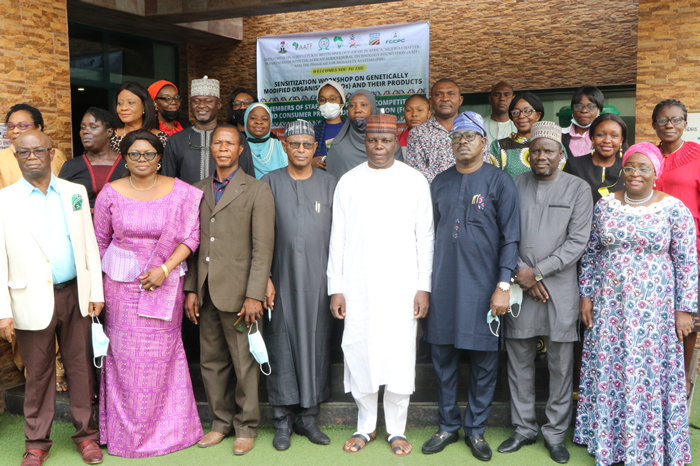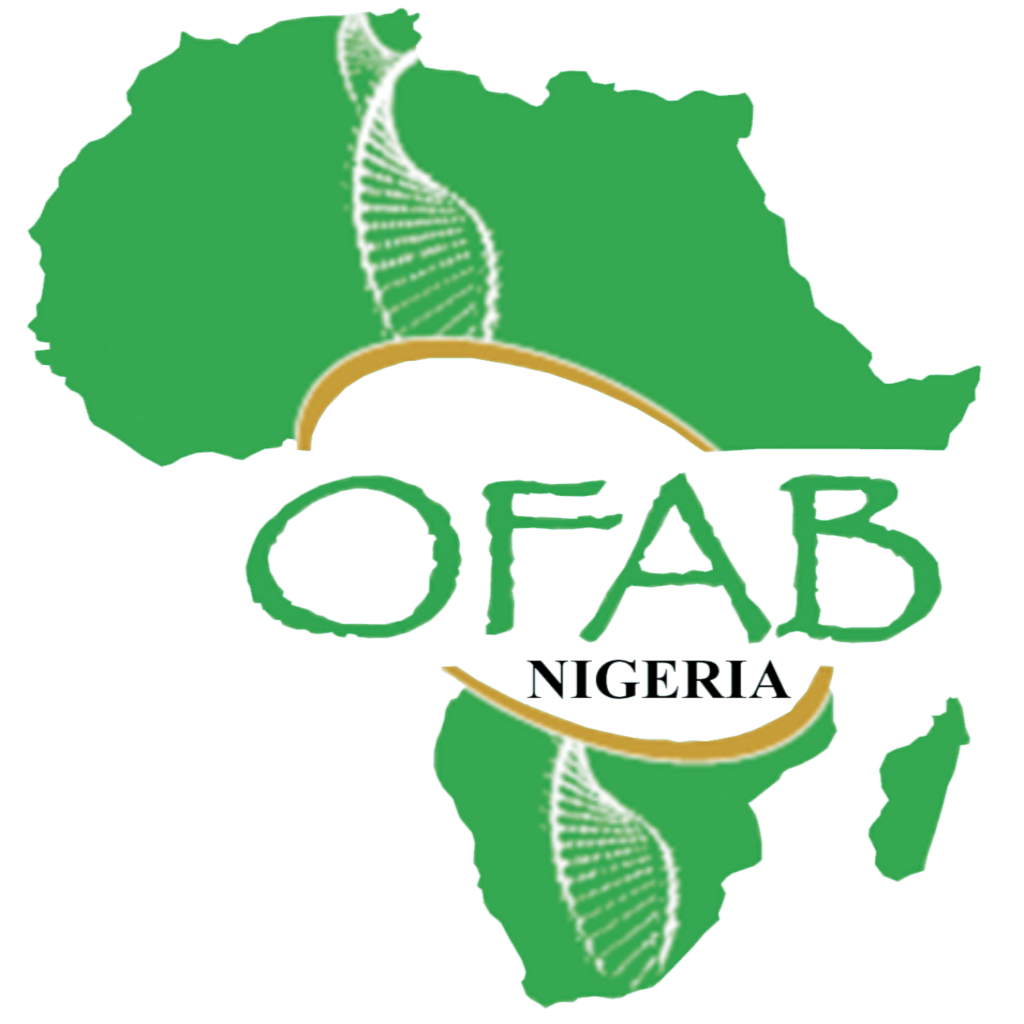
The Open Forum on Agricultural Biotechnology in Africa (OFAB), Nigeria Chapter under auspices of the National Biotechnology Development Agency, the African Agricultural Technology Foundation (AATF) and the Program for Biosafety Systems (PBS) held a public discourse aimed at creating sufficient awareness about Genetically Modified Organisms for Members of Staff of Federal Competition and Consumer Protection Commission (FCCPC) in Abuja. FCCPC is a Commission of the Federal Government saddled with the responsibility of promoting and protecting the rights of consumers to information and choice as well as ensuring a level playing field for businesses to thrive by promoting competitiveness that dismantles monopoly.
The key stakeholders in the biotechnology sector in Nigeria sensitized the FCCPC on Genetic Modification (GM) technology convinced that agricultural biotechnology holds a lot of promises for the development of agriculture and the nations industries. This helps in tackling mistrust and dispelling rumours and unfounded fears expressed in certain quarters against the technology.
Speaking during the opening session of the meeting, Deputy Director of National Biotechnology Development Agency and Country Coordinator, OFAB, Nigeria Chapter, Dr Rose Gidado, explained that building public awareness about the opportunities and potentials of biotechnology is a step in the right direction. According to her, the core objective of the sensitization is to promote dialogue amongst scientists, the biotechnology industry, policy makers and the public. Participants were informed about the transgenic journey which began since Nigeria’s foray into the sector till date.
Giving overview of the biotechnology programme in Nigeria, Dr. Gidado stated that modern biotechnology has advanced the knowledge of genes, gene organization and functions. She said agriculture is a knowledge- based activity and requires knowledge application for its increased productivity. Adopting biotechnology is a sure way towards achieving food security, she concluded.
Similarly, the Director General/CEO, NABDA, Professor Abdullahi Mustapha while welcoming the participants intimated them that biotechnology is a scientifically proven tool that has been revolutionizing the way things are done and that for centuries, humans have been manipulating genes of crops and animals. In the area of agriculture, he explained that biotechnology application provides an alternative to the use of chemicals in agricultural production as some transgenic plants are resistant to insects, pests and are able to thrive in harsh environmental conditions.
Speaking on the Regulatory Framework for Biotechnology in Nigeria, the Director General of National Biosafety Management Agency, NBMA, Dr Rufus Ebegba informed the participants that NBMA works to ensure that biotechnology is deployed safely without harm to humans and environment. Part of the efforts of the agency to deliver on its regulatory functions includes granting permits and accrediting some institutions for modern biotechnology practices. The agency approved confined field trials for Africa Bio-fortified Sorghum (ABS); GM cassava for postharvest spoilage delay; GM Cassava resistant to cassava mosaic virus and brown streak virus; GM Cassava for increase in starch content, GM rice modified for Nitrogen use efficiency, water use efficiency and salt tolerance; GM Soybeans tolerant to glyphosate herbicide for the control of weed; and have recently released Insect resistant cotton (Bollgard II) and Cowpea modified for resistance against Maruca insect pest for commercial use. Earlier, the DG had hinted that NBMA and FCCPC have signed a memorandum of understanding and that the training will boost the understanding about how modern biotechnology is being regulated to ensure safety of food and environment.
On his part, the Executive Vice Chairman/CEO, FCCPC, Mr. Babatunde Irukera who was represented in the meeting, called on stakeholders to ensure effective sensitization of consumers on GM foods. He assured that in time, consumers will be more receptive to GM products. Meanwhile, the FCCPC Chair who declared the Event open had while making a presentation on ‘Rights and Responsibilities of Consumers of Genetically Modified Foods stated that the consumers concern about GM food is safety. According to him, goods and services purchased by consumers and their production processes should be safe. Dr. Erukere said that agricultural biotechnology innovation is a way of ensuring food security; the need to protect consumers right to safety, value for money, information, choice, fair marketing of GM foods, redress, consumer education, representation and right to healthy environment becomes expedient. The EVC was represented by FCCPC’s Director of Quality Assurance and Development, Mrs. Mopelola Akeju.
Other timeless strategies to achieve the consumers’ buy-in to GM foods by the consumers would include proper education on the production processes by the proponents of the technology. NABDA and OFAB Nigeria Chapter are to lay the scientific evidence and facts bare on the table to allay the fears and safety concerns of the application and use of modern biotechnology and its biotech products. This was the view of the Director General/CEO of National Agricultural Seed Council (NASC), Dr Philip Ojo while delivering a good will message at the sensitization programme. NASC, he said, coordinates and regulates the seed industry of Nigeria to ensure the provision of adequate quantities of high-quality and improved seeds of all crops including GM seeds to the farmers. Two transgenic cotton varieties and one cowpea variety were registered and released by the National Variety Release Committee. These are products of modern biotechnology.
During the training, the Country Coordinator for Programme for Biosafety Systems, PBS, Dr. Matthew Dore made a presentation on: ‘Biosafety Global Practice’. According to him, the Cartagena Protocol provides for the establishment and maintenance means to regulate, manage or control the risks associated with the use and release of living modified organisms resulting from biotechnology which are likely to have adverse effect on human health and the environment. He hinted that biosafety assessment starts from earliest stages of the research and are performed up to the point of sales by the farmers. With functional biosafety systems in Nigeria, developmental goals that would result in economic growth will be achievable.
Affirming the safety of GM Crops, the Regional Director, African Agricultural Technology Foundation, AATF, Dr. Issoufou Abdourhamane Kollo, said Scientific Rules for examining GMO safety have been established by the Organization for Economic Cooperation and Development (OECD), World Health Organization (WHO), Food and Agricultural Organization (FAO) and National Biosafety Agencies. Dr Kollo who was represented by OFAB Country Coordinator, Dr Rose Gidado said that to ensure safety of GM crops, all modified DNA sequences must be submitted to the Biosafety Agency for examination.
While the Biotechnology Project Director, Centre for Science in the Public Interest, Washington DC, Gregory Jaffe, gave a hint on how to establish consumer trust in GM Foods. According to him, consumer acceptance of GE foods and other products will be possible when safety is sure and the technology deployed in sustainable manner. He said his centre is considering transfer of this technology to Africa as well as develop capacities in this regard.
Speaking on GMOs in the Media: What to believe and why, the Communications Officer, West and Central African Region, AATF, Mr. Alex Abutu charged the participants to source information from the professionals. He was represented by Mr. Onche Ode.
Exploring legal issues related to GMOs, the Executive Director, Citizens Advocacy for Social and Economic Right (CASER), Barrister Frank Tietie, notes that biotech related cases are actionable.

